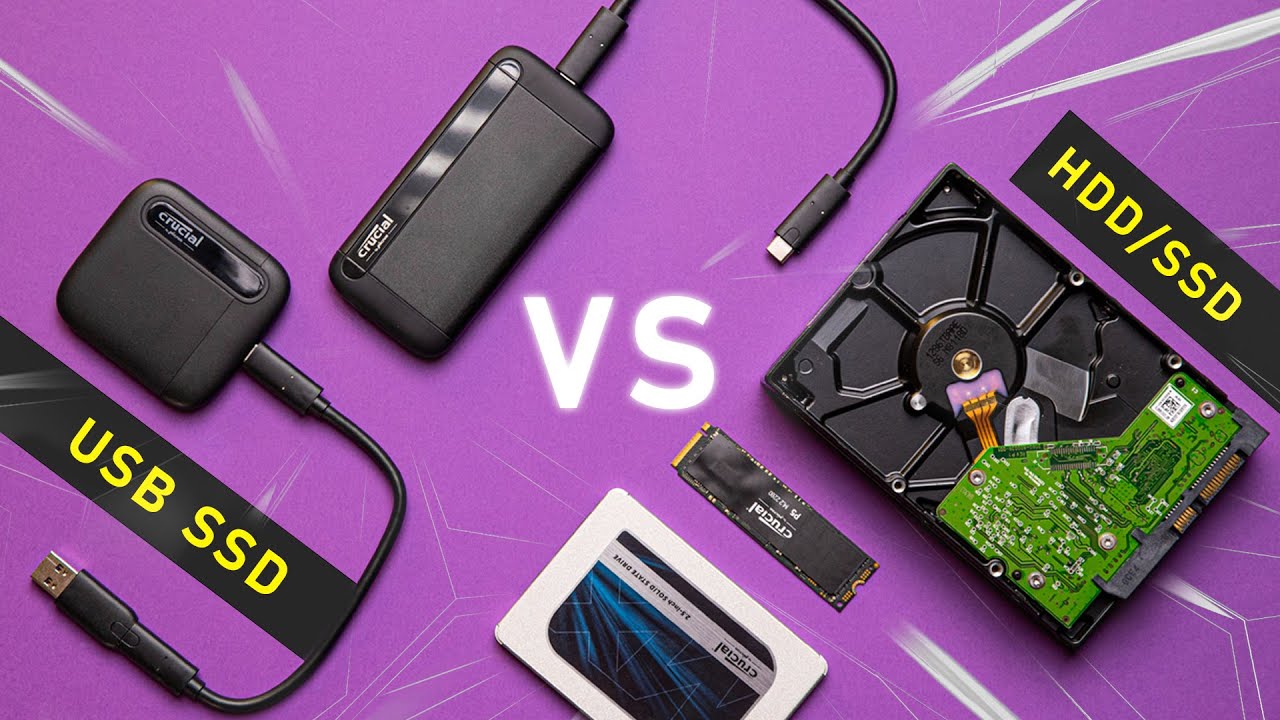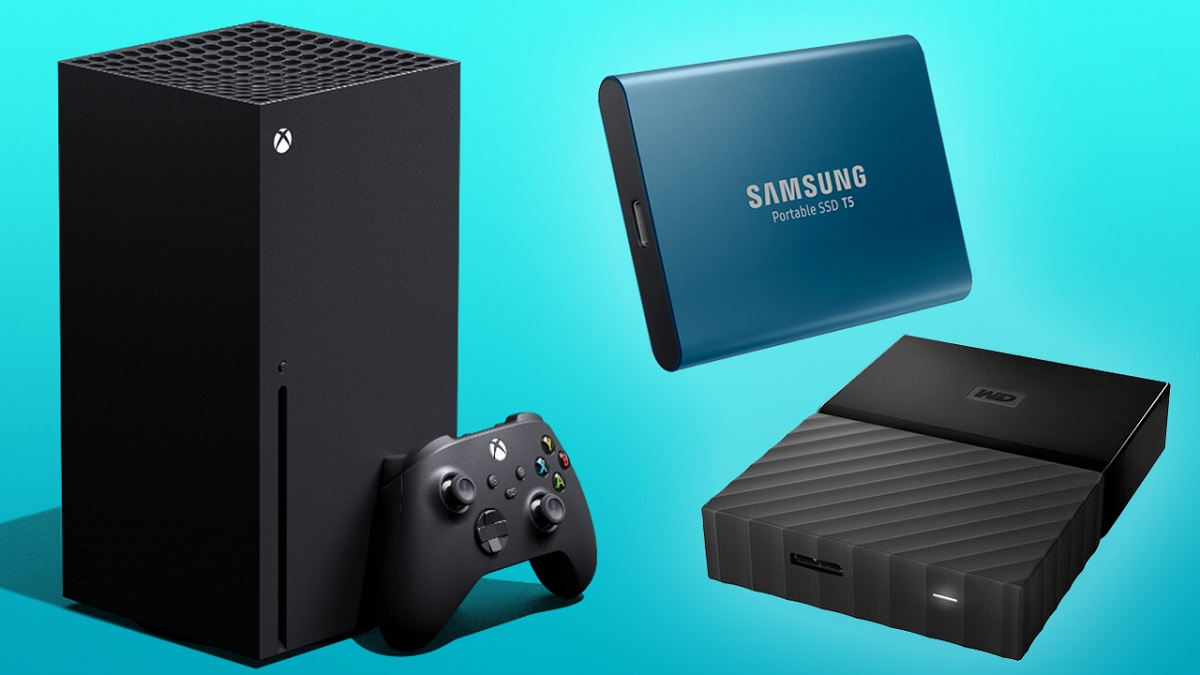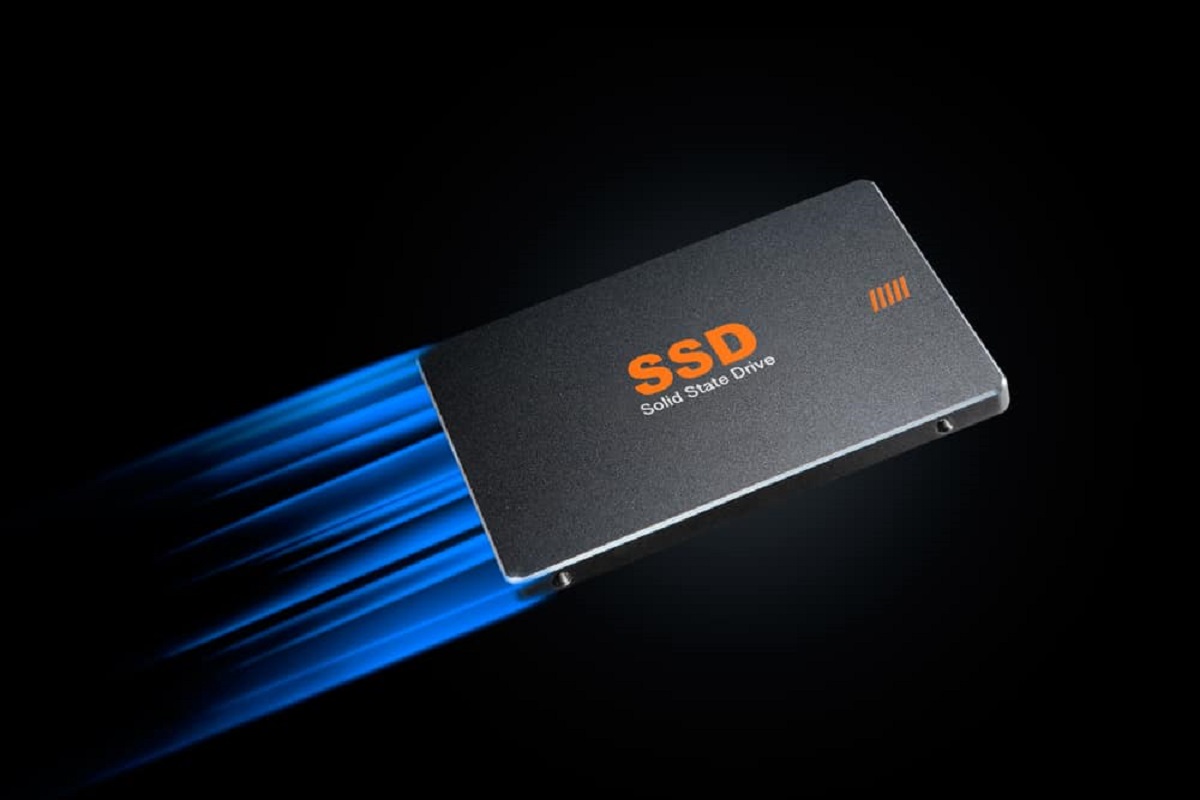Introduction
When it comes to storage solutions, the choice between a portable SSD (Solid-State Drive) and a regular hard drive can be quite a dilemma. Both options have their advantages and disadvantages, but the decision ultimately boils down to your specific needs and preferences. In this article, we will explore the reasons why you might choose a portable SSD over a regular hard drive.
Traditional hard drives have been the go-to option for many years, offering spacious storage capacity at an affordable price. However, with technological advancements, portable SSDs have emerged as a viable alternative, boasting significant advantages that make them a desirable choice for many users.
Speed
One of the key benefits of using a portable SSD is its remarkable speed. Unlike traditional hard drives that rely on spinning disks and mechanical components, SSDs use flash memory to store and retrieve data. This translates into lightning-fast read and write speeds, making file transfers and system boot-ups significantly quicker and more efficient. Whether you are working on large media files or running resource-intensive applications, a portable SSD can greatly enhance your productivity.
Portability
As the name suggests, portable SSDs are designed with mobility in mind. They are compact, lightweight, and easily fit into your pocket or bag, allowing you to carry your data wherever you go. Whether you are a student, a professional on the move, or simply someone who values convenience, a portable SSD offers the ultimate portability and flexibility that traditional hard drives cannot match.
Durability
Another major advantage of portable SSDs is their durability. Unlike regular hard drives, SSDs have no moving parts, making them less susceptible to physical damage caused by accidental drops or shocks. Furthermore, SSDs are more resistant to extreme temperatures and magnetic interference. So whether you are traveling or working in harsh environments, a portable SSD provides the peace of mind that your valuable data will remain safe and intact.
Noise
Regular hard drives produce noticeable noise due to the spinning of the disks and the movement of mechanical components. In contrast, portable SSDs are completely silent as they do not have any moving parts. If you prefer a quiet working environment or need to work in noise-sensitive locations, a portable SSD is the ideal choice.
Power Consumption
Portable SSDs are known for their low power consumption. Compared to traditional hard drives, SSDs require less energy to operate, resulting in prolonged battery life for laptops and other portable devices. Being energy-efficient not only saves power but also reduces heat generation, contributing to a cooler and more stable system.
Speed
When it comes to storage solutions, speed is a crucial factor to consider. This is where portable SSDs have a clear advantage over regular hard drives. The speed of a storage device is measured in terms of its read and write speeds, which determine how quickly files can be accessed and transferred. Portable SSDs, powered by advanced flash memory technology, offer significantly faster speeds compared to traditional hard drives.
Portable SSDs leverage the benefits of solid-state storage, which eliminates the need for moving parts. Unlike regular hard drives that rely on spinning disks to read and write data, SSDs use flash memory chips to store and retrieve information. This not only results in shorter access times but also allows for simultaneous data retrieval from multiple locations on the SSD, further enhancing overall performance.
The speed advantages of portable SSDs are particularly evident when it comes to file transfers and system boot-ups. Transferring large files, such as high-resolution videos or bulky software installations, can be a time-consuming task with a regular hard drive. However, with a portable SSD, these transfers are lightning-fast. The high sequential read and write speeds of SSDs ensure that files are transferred in a fraction of the time, allowing you to be more efficient and productive.
In addition to file transfers, the speed of a storage device also impacts system boot-up times. SSDs excel in this aspect, offering much faster boot-ups compared to regular hard drives. When your operating system is installed on a portable SSD, your computer can start up in a matter of seconds, providing you with quick access to your files and applications.
Another area where the speed of a portable SSD shines is in application performance. Resource-intensive applications, such as video editing software or virtual machines, can benefit greatly from the faster read and write speeds of SSDs. These applications require a continuous stream of data access, and a portable SSD ensures that the data is readily available, enabling smoother and more responsive performance.
Furthermore, portable SSDs are known for their consistent performance even as the drive fills up. Unlike regular hard drives, which tend to slow down as they reach capacity, SSDs maintain their speed regardless of the amount of data stored on them. This consistency ensures that you can rely on high-speed performance throughout the lifespan of your portable SSD.
Portability
In today’s fast-paced world, portability is a key factor when choosing a storage solution. Portable SSDs excel in this aspect, offering unparalleled convenience and flexibility compared to regular hard drives. The compact and lightweight design of portable SSDs makes them the perfect companion for users on the go.
Unlike traditional hard drives that often require an external power source and additional cables, portable SSDs are designed to be self-sufficient. They are powered by the USB port of your device, eliminating the need for any external power supply. This makes them highly portable and allows for seamless connectivity with a wide range of devices, including laptops, desktop computers, tablets, and even gaming consoles.
The small form factor of portable SSDs makes them incredibly easy to carry around. They can effortlessly fit into your pocket, backpack, or purse, enabling you to take your valuable data wherever you go. Whether you’re a student needing access to important documents, a professional traveling for business, or a content creator working on the go, a portable SSD offers the ultimate portability and convenience.
The benefit of portability extends beyond just the physical size of the storage device. Portable SSDs are also compatible with various operating systems, including Windows, macOS, and Linux, making them versatile and suitable for users with different device preferences. This universal compatibility ensures that you can seamlessly transfer and access your data across multiple platforms, without worrying about compatibility issues.
In addition to their physical portability, portable SSDs also offer the convenience of plug-and-play functionality. There is no need for complicated installation processes or software configurations. Simply connect the portable SSD to your device’s USB port, and it is instantly recognized, allowing you to quickly access, edit, and share your files. This hassle-free user experience adds to the overall convenience and usability of portable SSDs.
Moreover, portable SSDs offer the advantage of being resistant to physical shocks and vibrations. Unlike regular hard drives that can be damaged by accidental drops or jolts, SSDs are built with durability in mind. This makes them particularly suitable for users who are constantly on the move or working in rugged environments. You can have peace of mind knowing that your valuable data is safe, even in the face of unexpected mishaps.
Whether you are a student, a business professional, a photographer, or simply someone who values convenience, the portability of a portable SSD is a compelling reason to choose it as your primary storage solution. Its compact size, self-sufficient power, universal compatibility, and durability make it the ideal choice for those who need reliable and easily transportable storage.
Durability
When it comes to storage solutions, durability is a crucial factor to consider. Traditional hard drives rely on moving parts, such as spinning disks and mechanical read/write heads, making them more susceptible to physical damage. Portable SSDs, on the other hand, are built with durability in mind, offering robust protection for your valuable data.
The key advantage of portable SSDs lies in their solid-state construction. Unlike regular hard drives, SSDs have no moving parts. Instead, they use flash memory chips to store data. This lack of mechanical components makes portable SSDs more resilient to physical shocks and vibrations. Accidental drops or impacts that could potentially damage a traditional hard drive won’t have the same effect on an SSD.
Furthermore, portable SSDs are designed to withstand extreme conditions. They are more resistant to temperature fluctuations, making them suitable for use in both hot and cold environments. Additionally, SSDs are not affected by magnetic interference, ensuring that your data remains safe even in the presence of strong magnetic fields.
Portability often means that storage devices are subject to a higher risk of being accidentally mishandled. Whether you’re traveling, commuting, or working in a dynamic environment, your portable SSD is less likely to be damaged due to its solid-state nature. This durability factor makes SSDs an ideal choice for users who are always on the move and need a reliable storage solution for their important files.
Moreover, the durability of portable SSDs contributes to their overall lifespan. Regular hard drives are more prone to wear and tear over time, as their mechanical components can degrade with heavy use. SSDs, on the other hand, do not suffer from the same issue. With no moving parts, portable SSDs can handle a significantly higher number of read and write operations, resulting in a longer lifespan and more reliable performance over time.
In addition to physical durability, portable SSDs also offer data protection features that further enhance their reliability. Many SSDs come with built-in error correction algorithms and wear-leveling technology. These features detect and fix data errors, ensuring the integrity and consistency of your files. Wear-leveling technology evenly distributes data across the flash memory cells, preventing specific areas from being overly used and extending the lifespan of the SSD.
Whether you’re a frequent traveler, an outdoor enthusiast, or someone who simply wants a storage solution that can withstand the rigors of everyday use, a portable SSD provides the durability and reliability you need. Its solid-state construction, resistance to physical shocks, temperature fluctuations, and magnetic interference, coupled with advanced data protection features, make it an ideal choice for ensuring the safety and longevity of your important data.
Noise
When it comes to choosing a storage solution, noise can be an important factor to consider. Traditional hard drives generate noticeable noise due to the spinning disks and movement of mechanical components. In contrast, portable SSDs operate silently, providing a noise-free storage experience.
The absence of moving parts is one of the primary reasons why portable SSDs are quiet. Unlike regular hard drives where the spinning of the disks and the movement of the read/write heads create audible vibrations and whirring sounds, SSDs have a solid-state construction. With no mechanical components to produce noise, portable SSDs provide a silent storage solution that is particularly beneficial for those who prefer a quiet working environment or need to work in noise-sensitive locations.
The quiet operation of portable SSDs not only enhances user comfort but also makes them ideal for use in environments where noise can be a distraction or a cause for concern. Whether you’re working in a library, a shared office space, or a recording studio, the absence of noise from your storage device ensures a conducive and focused working environment.
Another advantage of SSDs in terms of noise is during the boot-up process. Regular hard drives tend to make mechanical noises as they spin up to reach operating speed during system start-up. Portable SSDs, however, do not have this issue since they do not rely on spinning disks. As a result, when your operating system is installed on an SSD, the boot-up process is completely silent, offering a seamless and uninterrupted start to your work or entertainment session.
Not only do portable SSDs operate silently, but they also generate less heat compared to regular hard drives. With no mechanical components producing friction and heat, SSDs are more energy-efficient, resulting in less heat dissipation during operation. This not only contributes to a cooler and more comfortable working environment but also helps prolong the lifespan of your storage device by reducing the risk of overheating.
Whether you value a quiet space for uninterrupted work, need a noise-free environment for audio or video recording, or simply prefer a storage solution that operates silently, a portable SSD is the perfect choice. Its solid-state construction eliminates mechanical noise, allowing you to enjoy a peaceful and serene workspace without any distractions.
Power Consumption
Power consumption is an essential consideration when choosing a storage solution, especially for portable devices like laptops and tablets that run on battery power. Portable SSDs have a significant advantage over regular hard drives in terms of power efficiency, offering extended battery life and energy savings.
Compared to traditional hard drives, portable SSDs consume significantly less power. This is due to their solid-state construction, which eliminates the need for mechanical components and reduces energy requirements. As a result, when using a portable SSD, you can expect your device’s battery to last longer, allowing for extended usage without the need to recharge frequently.
The low power consumption of portable SSDs also contributes to a cooler and more stable system. Hard drives generate heat during operation due to the spinning of the disks and the movement of mechanical components. On the other hand, SSDs generate less heat due to their solid-state design, resulting in reduced heat dissipation. This not only helps prevent overheating but also prolongs the lifespan of the storage device and other components in your system.
Moreover, portable SSDs are known for their efficient idle power management. When the storage device is not actively transferring data or performing read/write operations, it enters a low-power state to conserve energy. This feature is particularly beneficial when using portable devices in situations where intermittent access to data is required or when using the device in a standby or sleep mode. The SSD can quickly power up when needed, allowing for instant access to data without a significant drain on the battery.
In addition to the energy savings and extended battery life, portable SSDs contribute to environmental sustainability. With the global push towards greener technologies and reducing carbon footprints, opting for a low-power storage solution like an SSD aligns with eco-conscious practices. By consuming less energy, portable SSDs help reduce greenhouse gas emissions and energy consumption, leading to a more sustainable and greener future.
Whether you’re a frequent traveler, a student, or a professional constantly on the move, the power efficiency of a portable SSD can make a noticeable difference in your day-to-day usage. With extended battery life, reduced heat generation, and energy savings, you can enjoy longer productivity sessions, increased system reliability, and contribute to a more sustainable environment.
File Access
When it comes to accessing files quickly and efficiently, portable SSDs offer significant advantages over regular hard drives. The improved file access speed of SSDs can greatly enhance your overall productivity and user experience.
Portable SSDs utilize flash memory technology, which allows for faster read and write speeds compared to traditional hard drives. This means that files stored on an SSD can be accessed and loaded much more quickly, resulting in faster data retrieval and shorter waiting times. Whether you’re opening documents, running applications, or loading multimedia files, the speed of an SSD ensures a seamless and responsive user experience.
The faster file access speed of portable SSDs is particularly beneficial when dealing with large files or working with data-intensive applications. For example, video editors who work with high-definition footage can benefit from the quick read speeds of an SSD, allowing for smooth playback and efficient editing. Similarly, professionals working with large datasets in fields such as graphic design, architecture, and scientific research can experience faster data processing and analysis with an SSD.
The improved file access speed of portable SSDs is also advantageous for gamers. SSDs are known for reducing load times in games, ensuring that you can quickly jump into your favorite game without tedious waiting periods. This not only improves the overall gaming experience but also provides a competitive edge in multiplayer games where every second counts.
Another advantage of portable SSDs in terms of file access is the ability to handle multiple concurrent operations. Traditional hard drives can struggle with multitasking, as their mechanical components limit the ability to read and write data simultaneously. In contrast, SSDs excel in multitasking scenarios, where they can efficiently handle concurrent file transfers, software installations, and other data-intensive tasks without a significant drop in performance.
Moreover, portable SSDs offer consistent performance regardless of data fragmentation. Fragmentation occurs when files are stored in non-contiguous blocks on a storage device, leading to slower read and write speeds with regular hard drives. SSDs do not suffer from the same issues, as they can access data from any location on the drive with the same speed. This ensures that your files remain easily accessible and perform at optimal levels, even as the drive fills up over time.
Whether you’re a professional working on resource-intensive tasks or a casual user who values quick and efficient file access, a portable SSD can significantly improve your productivity and user experience. With faster read and write speeds, multitasking capabilities, and consistent performance, portable SSDs provide a reliable and efficient solution for accessing files quickly and effortlessly.
Security
Data security is a top priority for individuals and organizations alike. Portable SSDs offer several features and advantages that enhance the security and protection of your valuable data.
One of the main security advantages of portable SSDs is encryption. Many SSDs come with built-in hardware encryption capabilities, which allow you to encrypt your data at the hardware level. This means that your files are protected even if the SSD is removed from its original device. Encryption ensures that your data is secure and inaccessible to unauthorized users, providing peace of mind, especially when traveling or in case of theft or loss.
In addition to built-in encryption, portable SSDs often come with software tools that provide options for additional security measures. These tools allow you to set passwords, implement user authentication, and control access to your stored data. By enabling password protection and access controls, you can ensure that only authorized individuals can view and modify your files, adding an extra layer of security to your data.
Another security advantage of portable SSDs is their resistance to physical damage. As mentioned before, SSDs have a solid-state construction without any moving parts. This makes them more durable and less prone to data loss due to physical shocks, drops, or vibrations. Traditional hard drives, with their sensitive mechanical components, are more susceptible to data corruption in case of physical damage. By using a portable SSD, you can mitigate the risk of data loss in such scenarios.
Furthermore, the lack of moving parts in portable SSDs reduces the chance of data loss due to mechanical failure. Traditional hard drives are susceptible to wear and tear over time, as the mechanical components degrade with usage. SSDs, on the other hand, have a longer lifespan and higher reliability due to their solid-state nature. This means that your data is less likely to be lost or corrupted due to mechanical failure, providing increased security and safeguarding your files for longer periods.
The absence of noise production in portable SSDs also contributes to security in certain scenarios. In environments where acoustic leakage poses a security risk, such as in confidential meetings or high-security offices, the silent operation of an SSD ensures that no sound signals can be intercepted or analyzed to gain access to sensitive information.
Whether you’re concerned about safeguarding personal data or protecting sensitive business information, portable SSDs offer enhanced security measures to protect your valuable files. With built-in hardware encryption, additional software tools, resistance to physical damage, and increased reliability, portable SSDs provide peace of mind by ensuring that your data remains secure and accessible only to authorized users.
Price
Price is a significant factor to consider when choosing a storage solution. Historically, traditional hard drives have offered a more cost-effective option in terms of storage capacity. However, the price gap between portable SSDs and regular hard drives has been narrowing in recent years, making SSDs a more accessible choice for many users.
It’s important to note that while portable SSDs may have a higher upfront cost compared to regular hard drives, the overall value and benefits they offer make them a worthy investment. The price of a portable SSD is influenced by factors such as storage capacity, brand, and performance specifications. As technology advances and SSD manufacturing becomes more widespread, the cost per gigabyte of storage continues to decrease, making SSDs increasingly affordable.
When comparing the price of a portable SSD to a regular hard drive, it’s important to consider the additional benefits SSDs provide. The speed, portability, durability, and power efficiency of portable SSDs can contribute to increased productivity, convenience, and peace of mind. These advantages can bring significant value and offset the slightly higher price point.
Furthermore, the long-term cost considerations should also be taken into account when evaluating the price of a storage solution. Portable SSDs typically have a longer lifespan and higher reliability compared to regular hard drives. This means that you are less likely to incur additional expenses for data recovery or replacing a failed storage device, which can be costly and inconvenient.
In addition, the improved power efficiency of portable SSDs contributes to energy savings, resulting in lower electricity bills and reduced environmental impact. Over time, these energy savings can add up and provide a cost advantage.
It’s worth mentioning that the price of portable SSDs is constantly evolving due to advancements in technology and market competition. The availability of different brands and models allows for price comparison and the opportunity to find affordable options that suit your budget and storage requirements.
Ultimately, the decision between a portable SSD and a regular hard drive depends on your specific needs and budget. While portable SSDs may have a slightly higher upfront cost, they offer numerous advantages that make the investment worthwhile in terms of improved performance, enhanced reliability, and increased productivity. Considering the value and benefits they bring, portable SSDs are becoming an increasingly popular choice for those seeking a reliable and efficient storage solution.
Conclusion
When comparing portable SSDs to regular hard drives, it is evident that SSDs offer several advantages that make them a compelling choice for many users. The speed, portability, durability, noiselessness, power efficiency, and enhanced file access of portable SSDs provide significant benefits that can greatly enhance productivity, convenience, and data security.
Portable SSDs leverage flash memory technology, resulting in faster read and write speeds compared to traditional hard drives. This translates into quicker file transfers, faster system boot-ups, and smoother performance when working with resource-intensive applications.
The compact and lightweight design of portable SSDs makes them highly portable, allowing you to carry your data wherever you go. Their solid-state construction also makes them more durable and resistant to physical shocks, ensuring that your valuable data remains safe, even in demanding environments.
With no moving parts, portable SSDs operate silently, providing a quiet working environment and eliminating the vibrations and noise typically associated with regular hard drives. This can be particularly advantageous for those who work in noise-sensitive environments or simply prefer a peaceful space without distractions.
Portable SSDs also consume less power, resulting in extended battery life for portable devices and reducing heat generation for a cooler and more stable system. Their energy efficiency contributes to cost savings and environmental sustainability.
Furthermore, portable SSDs offer faster and more efficient file access, enabling quick data retrieval, seamless multitasking, and consistent performance. With improved read and write speeds, SSDs ensure that your files are easily and quickly accessible, regardless of storage capacity or file fragmentation.
In terms of security, portable SSDs provide features like hardware encryption, password protection, and access controls to safeguard your valuable data. Their durable construction and resistance to physical damage also reduce the risk of data loss due to accidents or mishandling.
While portable SSDs may have a slightly higher upfront cost compared to regular hard drives, the overall value they offer in terms of speed, portability, durability, power efficiency, file access, and security make them a worthwhile investment. The price gap between SSDs and hard drives continues to narrow, making SSDs increasingly accessible to a wider range of users.
Ultimately, the choice between a portable SSD and a regular hard drive depends on your specific needs, budget, and preferences. However, with their numerous advantages, portable SSDs have emerged as a reliable and efficient storage solution that meets the demands of today’s digital world. Whether you’re a student, a professional on the move, a creative individual, or anyone in need of secure, fast, and portable storage, a portable SSD is a wise and future-proof choice.

























